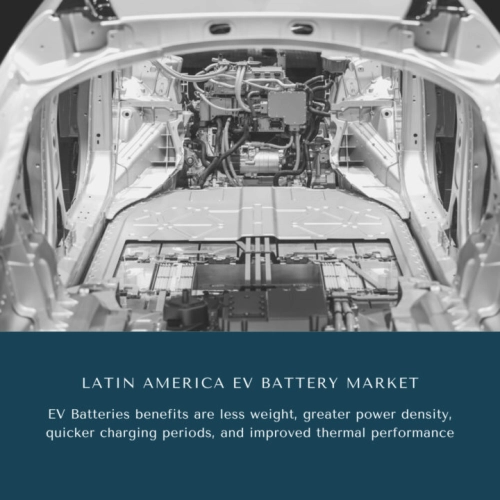
- Get in Touch with Us

Last Updated: Apr 25, 2025 | Study Period: 2023-2030
A rechargeable battery is known as an electric vehicle battery (EVB, often referred to as a traction battery) that powers the electric motors in a battery electric vehicle (BEV) or hybrid electric vehicle (HEV).
The most common application of lithium-ion batteries may be seen in electric cars. It has been one of the most popular trends in the transportation sector for a while, and it has been expected that market growth would only pick up speed in the future.

When compared to nickel-metal hydride (NiMH) or lead-acid type systems, these kinds are typically employed because they offer better energy densities than other chemistries as well as cheaper prices per unit of storage.
Among the benefits are less weight, greater power density, quicker charging periods, and improved thermal performance.
The Latin America EV Battery Market accounted for $XX Billion in 2022 and is anticipated to reach $XX Billion by 2030, registering a CAGR of XX% from 2023 to 2030.
Mercedes-Benz Energy has agreed to supply EV batteries to BatteryLoop for their scalable, circular energy storage devices, GM and Honda are working together to build inexpensive EVs.
A prototype manufacturing facility for laminated all-solid-state battery cells has been presented by the Japanese automaker at its research facility in Kanagawa Prefecture in an effort to maintain all production in-house.
All-solid-state batteries are frequently hailed as a potentially game-changing technology that will hasten the adoption of electric vehicles (EVs).
These batteries have advantages over conventional lithium-ion batteries, including a roughly doubled energy density, significantly faster charging times, and lower costs because they are made from cheaper raw materials.
| Sl no | Topic |
| 1 | Market Segmentation |
| 2 | Scope of the report |
| 3 | Abbreviations |
| 4 | Research Methodology |
| 5 | Executive Summary |
| 6 | Introduction |
| 7 | Insights from Industry stakeholders |
| 8 | Cost breakdown of Product by sub-components and average profit margin |
| 9 | Disruptive innovation in the Industry |
| 10 | Technology trends in the Industry |
| 11 | Consumer trends in the industry |
| 12 | Recent Production Milestones |
| 13 | Component Manufacturing in US, EU and China |
| 14 | COVID-19 impact on overall market |
| 15 | COVID-19 impact on Production of components |
| 16 | COVID-19 impact on Point of sale |
| 17 | Market Segmentation, Dynamics and Forecast by Geography, 2023-2030 |
| 18 | Market Segmentation, Dynamics and Forecast by Product Type, 2023-2030 |
| 19 | Market Segmentation, Dynamics and Forecast by Application, 2023-2030 |
| 20 | Market Segmentation, Dynamics and Forecast by End use, 2023-2030 |
| 21 | Product installation rate by OEM, 2023 |
| 22 | Incline/Decline in Average B-2-B selling price in past 5 years |
| 23 | Competition from substitute products |
| 24 | Gross margin and average profitability of suppliers |
| 25 | New product development in past 12 months |
| 26 | M&A in past 12 months |
| 27 | Growth strategy of leading players |
| 28 | Market share of vendors, 2023 |
| 29 | Company Profiles |
| 30 | Unmet needs and opportunity for new suppliers |
| 31 | Conclusion |
| 32 | Appendix |